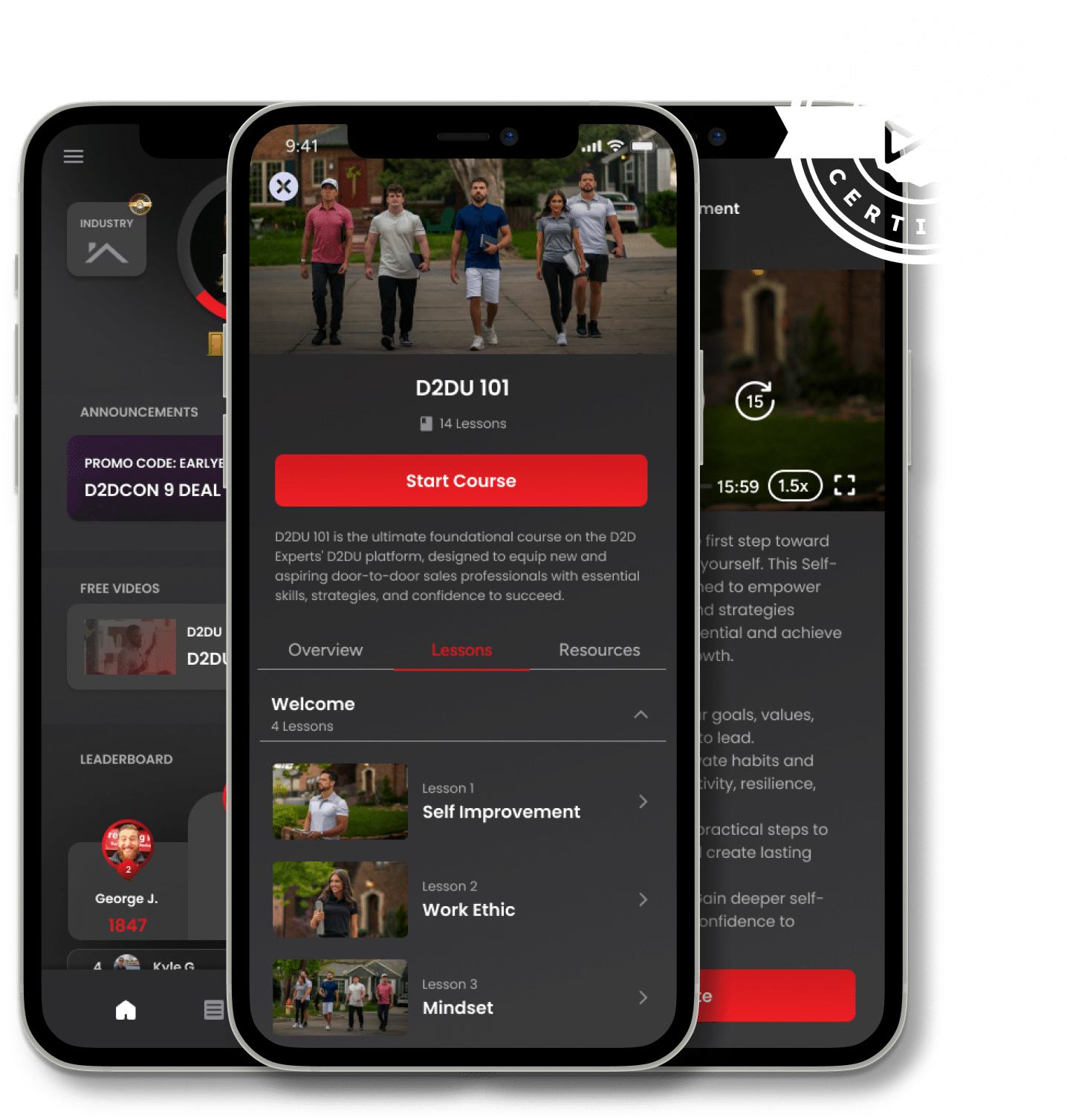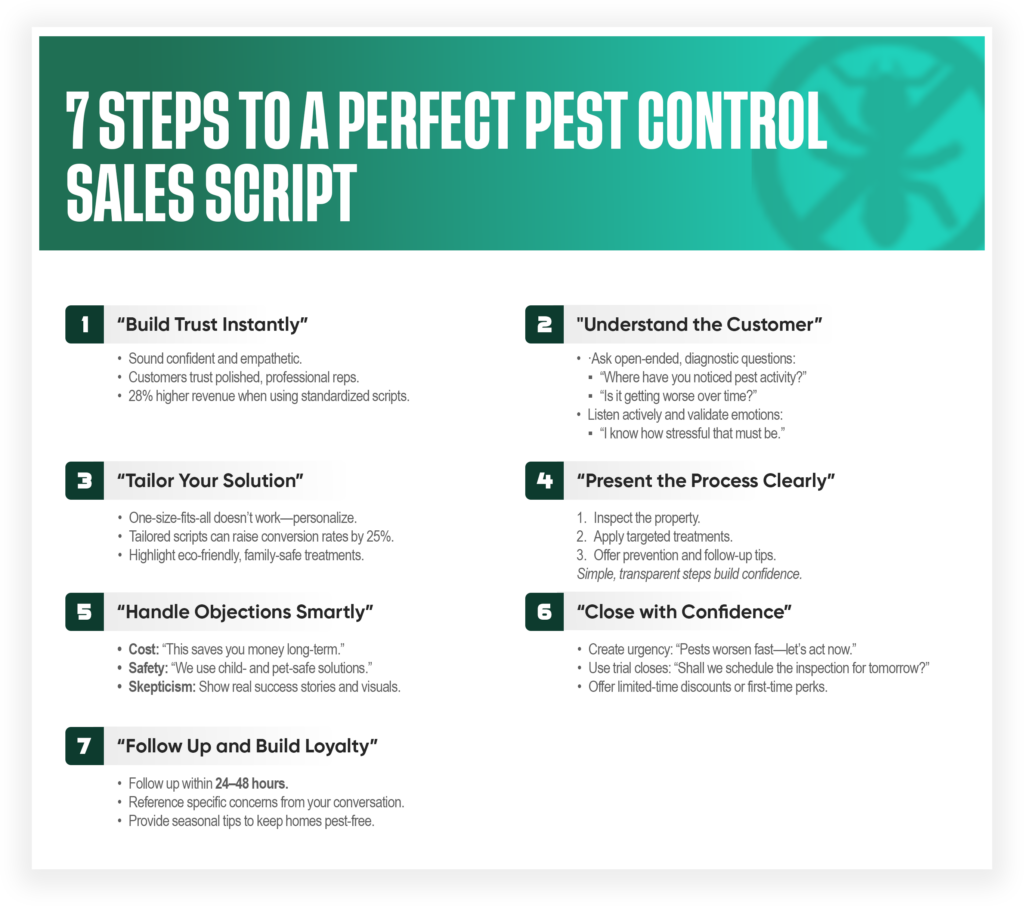Companies that rely on standardized sales pipeline practices including the use of effective scripts see a 28% higher revenue growth compared to those without such processes.
Imagine you’re mid-conversation with a potential customer, and they hit you with the dreaded “Let me think about it.” Without a solid script, your brain goes blank, and the conversation fades out. A great sales script prevents these awkward moments by acting as your trusty roadmap, ensuring every interaction is smooth, engaging, and effective.
A well-crafted pest control sales script can be the difference between closing a deal and walking away empty-handed. Think of it as your ultimate playbook, guiding you through each conversation. A carefully constructed script ensures you hit all the key points and build trust with potential customers by showing them you genuinely care about their pest problems—not just your commission.
Let’s explore why a script is a must-have and how to craft a pest control sales script that resonates with your audience while leaving them impressed by your expertise and charm..
Master Your Pest Control Pitch!
Craft High-Converting Sales Scripts with D2D University.

Why a Pest Control Sales Script is Crucial
You Build Customer Trust
Imagine calling a pest control service, and the salesperson sounds unsure or unprepared—would you trust them to handle your home’s pest problems? Probably not. When you appear polished and professional, customers immediately feel they’re in capable hands.
Here’s how a script helps:
- Professionalism: A well-crafted script ensures you hit all the key points, addressing concerns with authority and precision. This demonstrates your expertise and reliability.
- Consistency: Every customer gets the same high-quality experience, which builds your reputation as a dependable pest control expert.
- Empathy: Scripts allow you to weave empathy into your conversation effortlessly. “I get how frustrating it is to deal with ants in the kitchen—no one wants that!” makes customers feel heard and understood.
You Stay on Track
We all have off days. Maybe you’re distracted, tired, or dealing with a demanding customer—but with a script, you’re always on point. Think of it as your pest-control sales GPS, guiding you through the twists and turns of customer conversations without missing a beat.
- Eliminate Awkward Pauses: A script keeps the flow natural and conversational, even when the customer throws you a curveball. You’ll always have the next step ready.
- Focus on What Matters: Scripts ensure you don’t spend too much time on unimportant details. Instead, you’ll zero in on pain points and solutions.
- Adaptability: While your script provides structure, it leaves room for flexibility. You can adjust your tone or approach based on the customer’s unique needs while staying aligned with the script’s objectives.
Read Also “Pest Control Advertising”

How Sales Scripts Drive Conversions
Sales scripts aren’t just cheat sheets—they’re your secret weapon for turning conversations into conversions. Think of them as the ultimate playbook, guiding reps through every stage of the sales process while helping them connect with customers on a deeper level.
Tailored for the Win
One-size-fits-all doesn’t cut it in sales. Customizing your sales scripts to match the specific needs of your target audience can boost conversion rates by an impressive 25%. It’s all about showing your prospects you get them. Whether selling pest control services or solar panels, tailoring your pitch to their pain points and priorities makes you more relatable and compelling.
Follow-Up Mastery
Here’s the deal: 80% of sales require multiple follow-ups. If you’re not following up, you leave money on the table. A strong script gives you a clear roadmap for these follow-ups, keeping prospects engaged without feeling pressured. Think of it as a friendly nudge that says, “Hey, I haven’t forgotten about you, and I’m here to help.”
Understanding the Customer’s Perspective
Before you even think about diving into your pitch, pause and take a second to imagine what your customer is going through. Picture this: It’s 8:00 AM, and they’re already late for work when they spot a trail of ants marching triumphantly across the kitchen counter. Or worse, they hear scratching noises from the attic and realize their uninvited “guests” are setting up camp.
Common fears and concerns
Let’s face it: customers are not in a happy-go-lucky mood when they call pest control. They’re dealing with a problem they didn’t ask for, and they’ve got a million questions buzzing in their heads, like:
“Will this actually work?”
Let’s be honest—many of your customers have probably tried DIY methods that failed miserably. They want to know your solution will work, not just today but for the long haul.
“How much is this going to cost me?”
Nobody likes surprise bills, especially when they’re already dealing with the unexpected. Transparency about pricing can calm nerves faster than a cup of chamomile tea.
“Is this safe for my family and pets?”
Safety is always a top concern. Whether it’s curious toddlers or a beloved golden retriever, customers need reassurance that your treatments won’t cause more problems than they solve.
Tailoring Your Approach based on the customer pain points
The magic happens when you stop pitching at your customers and start talking with them. Pest Control Sales Training emphasizes the importance of tailoring your approach so customers feel you’re solving their problem, not just selling a service.
Relatable success stories
Nothing builds trust faster than showing you’ve been in the trenches before—and won. Tell about a nearby neighbor or a family in their area who faced a similar problem and walked away pest-free.
For example: “I just helped a family down the street with the same ant problem you’re describing. They were worried about keeping their countertops safe for their kids, but after one treatment, the ants were gone, and they couldn’t be happier.”
Stories like these make your customers feel like they’re not alone—and that you’re the expert who can deliver results.
Highlight your unique expertise
It’s one thing to say you’re good at pest control; it’s another to back it up with specifics. Talk about your eco-friendly treatments that are tough on pests but gentle on the environment. Mention your cutting-edge tools or specialized plans that target their specific issue.
For example: “We use treatments designed to eliminate pests quickly while being 100% safe for your family and pets. Our prevention plans ensure you won’t have to deal with this again anytime soon.”
When you present yourself as a problem-solver with a unique approach, customers feel reassured they’re in the best hands.
Build Trust Through Empathy and Understanding
People want to feel heard. They need to know you’re not just there to make a sale but to help them solve a frustrating problem in a structured way. Simple phrases like: “I understand how frustrating it is to deal with this. Let’s make sure we take care of it once and for all.” can turn a hesitant customer into a confident one.
When you show empathy, expertise, and a genuine desire to help, you’re not just solving a pest problem—you’re building loyalty that lasts long after the pests are gone.
The Ideal Pest Control Sales Script Flow
1- Greeting and Rapport Building
First impressions matter—a lot. Start with a greeting that’s warm, friendly, and a little personalized. No one wants to feel like just another sales call.
- Start strong to make a positive first impression: “Hi, I’m [Your Name] from [Company Name]. I couldn’t help but notice some potential signs of pest activity in your area, and I wanted to check-in. How’s everything going for you today?”
- Make it personal with friendly, approachable language: If you’re door-knocking, reference something specific: “Your front yard looks great! Have you had any issues with ants near your garden beds?”
- Be approachable: Smile, use open body language, and don’t rush. Building rapport is about making them feel comfortable and valued.
2- Identifying the Problem
You channel your inner detective to uncover what’s happening at this stage without making the customer feel like they’re being grilled. Think of yourself as a helpful guide, not an interrogator. You aim to ask the right questions, actively listen to their concerns, and ensure they feel heard and understood. When done right, this step builds trust and lays the groundwork for presenting your pest control services as the ideal solution.
Ask diagnostic-style questions
Great questions don’t just scratch the surface—they dig deep. Your job is to understand the extent of the issue so you can tailor your solution to their needs. Think of it as building a pest problem profile.
- “Have you noticed any unusual pest activity recently?”
This open-ended question invites the customer to share details about their experience. You might hear about trails of ants in the kitchen, strange noises in the attic, or gnaw marks on wires. The more information you gather, the better equipped you are to present a solution.
- “Are there specific areas where you’ve seen pests, like the kitchen or attic?”
Pinpointing the problem’s location helps you assess the scope of the issue. For example, a pest infestation isolated to the basement may require a different treatment plan than one affecting multiple areas of the home.
- “Have you noticed this issue getting worse over time, or is it a recent development?”
Understanding the timeline gives you insight into whether this is an isolated incident or part of a recurring problem.
- “Have you tried any treatments on your own?”
This question helps you determine whether previous DIY attempts have worsened the problem or left gaps that need addressing.
Listen Like You Mean It
Respond with genuine concern when a customer mentions their ant problem or how raccoons have turned their attic into a hangout spot.
Example: “Oh no, that sounds incredibly stressful! No one should have to deal with that in their own home. Let’s make sure we take care of this for you.”
This simple acknowledgment turns what could feel like a sales pitch into a conversation between someone who cares and someone who needs help.
Validate Their Concerns
Many customers feel embarrassed about pest problems. Reassure them that their situation is not uncommon and that you’ve handled similar cases successfully.
Example: “I completely understand how upsetting this must be, but you’re not alone. We’ve helped countless homeowners deal with similar issues, and we’ll do the same for you.”
Empathetic listening to convey an understanding of the customer’s concerns
Listening isn’t just about hearing the words—it’s about picking up on the emotions behind them. When customers share their concerns, they seek someone who genuinely understands their frustration. Empathetic listening is your secret weapon for showing you care.
3- Offering the Solution
Now it’s time to shine. This is where you present your pest control services as the ultimate answer to their problem—but keep it clear and conversational.
Highlight the benefits
- “Our treatments are safe, effective, and tailored to your home’s unique needs.”
- “We offer eco-friendly solutions, so you don’t have to worry about harsh chemicals.”
- “Our technicians are certified pros who know how to do the job right.”
Break down the process in detail
- “First, we’ll do a thorough inspection to find the source of the problem.”
- “Then, we’ll apply targeted treatments that eliminate pests and prevent them from returning.”
- “Finally, we’ll provide tips and follow-up services to keep your home pest-free.”
Overcoming Hesitations and Common Objections
Let’s be honest: Objections are part of the game. But with the right mindset, strategic responses, and persistence, you can turn those “Maybes” into “Yeses.” Here’s how to address some of the most common objections with confidence and finesse, drawing from Sam Taggart’s playbook that he walks through in this video —>
Price Concerns
Price is a sensitive topic, but with the right framing, you can help customers see the value in your service.
- Empathy First: “I totally get it. No one likes unexpected expenses, but here’s why our service is worth it: Not only do we eliminate the problem, but we also prevent it from coming back—saving you time, stress, and money in the long run.”
- Tie Back to Long-Term Savings: Incorporate visuals if possible, like showing before-and-after photos of untreated damage from other homes. In the D2D Experts video, Sam Taggart emphasizes the importance of creating urgency by highlighting value: “I’m not here to sell you a roof—I’m here to see if we can save you thousands by extending the life of the one you already have.” Using this principle, you can show customers how investing now prevents more significant expenses later.
Safety Worries
Safety is often top-of-mind, especially for families with kids and pets. Reassuring them with specifics can ease their concerns.
- Highlight Eco-Friendly Practices: “That’s a great question! Our treatments are designed to be safe for kids, pets, and the environment. We use eco-friendly products that are tough on pests but gentle on your home.”
- Share Examples: Borrow from the D2D Experts’ approach to building rapport: “As mentioned in the video, referencing neighbors builds credibility. You could say, ‘The Johnsons down the street had the same concern, and they were thrilled to see how safe and effective our treatments were.’”
Skepticism
Some customers are skeptical because they’ve heard pitches that didn’t deliver. That’s where your confidence and evidence come into play.
- Acknowledge Their Doubts: “I hear you. A lot of our customers felt the same way initially. They’d tried other solutions that didn’t work, which made them hesitant to commit.”
- Follow Up with Proof: Sam Taggart suggests leveraging visual tools to reinforce credibility: “When you show photos or examples of what you’ve seen in the neighborhood, customers realize you’re not just talking—you’re showing real problems that need real solutions.” For example: “The Johnsons didn’t realize how bad their streaking was until I showed them pictures of their roof. Once they saw the damage, they knew we were the right choice.”
Compelling counterarguments to keep the conversation moving forward
As Sam emphasizes, pacing yourself during the conversation and reframing objections as opportunities to provide value is key. For example:
If a customer says, “I’m not sure I need this right now,” you could reply: “Totally understand. Most people feel that way until they see how much peace of mind this provides. Why don’t we do a quick inspection at no obligation? That way, you’ll have all the info you need to decide.”
If they seem hesitant to let you inspect their property, use the “fairness close” from the video:
“It takes just 10 minutes to assess everything, and it’s completely free. Does that sound fair?”
Closing Techniques for Pest Control Sales
Closing is where you seal the deal and turn all your hard work into a new customer.
Here’s how to do it effectively:
Creating an Urgency to Close the Sale
Urgency drives decisions. Without it, customers often delay taking action. Here’s how to light a fire under the conversation:
- Highlight Consequences: “The longer pests go untreated, the more damage they can cause. Let’s stop this before it becomes a bigger issue.”
- Time-Sensitive Offers: Use deadlines to motivate action. “We’re running a 15% discount on new bookings this week—let’s lock that in for you today.”
- Seasonal Considerations: Leverage the time of year. “With summer here, pests like ants and mosquitoes become more active. Starting now ensures your home is protected all season.”
Closing Statements That Encourage the Customer to Commit
The best closing statements make saying “yes” feel natural and effortless. Keep it confident and conversational:
- Confirm the Next Step: “Based on our discussion, I recommend starting with our comprehensive plan. Would you like to schedule your first treatment this week?”
- Use Trial Language: “Let’s start with the initial treatment, and I’ll check back to ensure everything is up to your expectations.”
- Assume the Close: “I’ll schedule your inspection for tomorrow afternoon—does that time work for you?”
Offering Discounts or Promotions to Sweeten the Deal
Everyone loves a deal, and a well-placed promotion can tip the scales in your favor:
- First-Time Customer Perks: “As a new customer, you’ll get a free inspection and 10% off your first service.”
- Bundled Services: “Sign up for our annual plan today, and we’ll include a free quarterly follow-up visit.”
- Exclusive Limited-Time Offers: “This month, we’re offering $50 off rodent control services when you book within the next 48 hours.”
Effective Follow-Up Practices
Following up is where the magic happens. It’s not just a post-sale courtesy—it’s a chance to reinforce trust, address lingering concerns, and solidify the relationship. Here’s how to do it effectively:
- Timely Follow-Ups: Reach out within 24–48 hours after the initial meeting. For example, “Hi [Name], it was great speaking with you yesterday. Do you have any questions about the plan we discussed?” Timeliness shows commitment and keeps you at the top of your mind.
- Personalized Check-Ins: Tailor your follow-ups. Reference specific concerns they shared. “I remember you mentioned concerns about the attic. Have you noticed any changes since our inspection?”
- Add Value: Provide tips or updates demonstrating your investment in their pest control success. “Here are three quick tips to keep pests at bay during summer.”
Customizing Your Script for Different Scenarios
One-size-fits-all doesn’t work in sales. Tailor your script to fit the situation and the customer’s needs:
- Seasonal Pests: If it’s summer, focus on ants or mosquitoes. For winter, highlight solutions for rodents seeking warmth indoors.
For example: “During the colder months, pests like mice and rats look for cozy spaces—let’s make sure your home isn’t one of them.”
- Residential vs. Commercial: For homeowners, emphasize safety and family. Businesses should focus on efficiency and minimizing disruptions.
For example: “Our commercial plans are designed to eliminate pests while keeping your operations running smoothly.”
- Urgent Infestations: Skip the small talk for emergency calls. Go straight to solutions.
For example: “Let’s start immediately to stop the problem before it spreads further.”
Key Dos and Don’ts
Top Dos for Crafting an Effective Sales Script
- Be Relatable: Use conversational language that feels natural. “I know pests are the last thing anyone wants to deal with—let’s take care of this quickly.”
- Focus on Benefits: Highlight what the customer gains. “Our eco-friendly treatments are effective and safe for your family.”
- Adapt and Evolve: Regularly update your script based on feedback. Stay flexible during conversations to respond to unique customer concerns.
- Practice: Rehearse until your delivery is confident and seamless but not robotic.
Pitfalls to Avoid During the Sales Process
- Don’t Use Jargon: Simplify technical terms. Customers care about results, not complex explanations.
- Avoid Sounding Pushy: Guide the conversation instead of forcing decisions. “When would be a good time to schedule your first treatment?” sounds better than “You should sign up now.”
- Don’t Overpromise: Be honest about what your service can achieve. Overpromising leads to distrust and dissatisfaction.
- Skip Monotony: A script should guide, not box you in. Keep it fresh by adapting to each customer’s personality and needs.
Master Your Pest Control Pitch!
Craft High-Converting Sales Scripts with D2D University.

A well-crafted pest control sales script is more than just a tool
A pest control sales script is your pathway to building trust, addressing customer concerns, and consistently closing deals. Combining empathy, expertise, and a personalized approach can let you create meaningful connections beyond solving pest problems and setting you apart as a trusted professional. With practice and commitment, your script becomes a game-changer, turning every interaction into an opportunity for success.
FAQs
Q1: What is a pest control sales script?
A pest control sales script is a prewritten outline or set of talking points used by sales reps to guide conversations with prospects, whether door-to-door, over the phone, or during follow-up calls. It helps streamline the pitch, handle objections, and close the deal effectively.
Q2: Why should I use a pest control sales script?
Scripts ensure consistency, build confidence, and improve conversion rates. Especially for new reps, a well-crafted script reduces the chance of forgetting key points or stumbling over objections.
Q3: What should be included in a pest control sales script?
A strong script should include:
- A professional introduction
- Quick pain-point targeting (e.g., “Have you noticed more bugs this summer?”)
- Brief service explanation
- A unique value proposition
- Common objection handling (e.g., cost, timing, safety)
- A clear call to action or close
Q4: Can I customize the sales script for different neighborhoods or customer types?
Absolutely. Tailoring your script based on the type of pest problems in a specific area or homeowner profile can increase relevance and results. Always adjust based on context.
JP Arlie is a seasoned professional with a remarkable 30-year career in the direct sales industry. He has achieved significant milestones, leading organizations responsible for over 300,000 in-home sales transactions and recruiting more than 40,000 sales representatives.
JP’s versatile journey in the direct sales field has seen him take on various roles, from business owner to Vice President in a publicly traded company. One of JP’s core values is his commitment to positively impact the lives of others and change the course of history. Additionally, JP serves as an esteemed Executive Education Coach at Harvard Business School’s Program for Leadership Development.
JP Arlie specializes in vital areas, including recruiting and retention strategies through effective systems and processes. His insights have proven instrumental in helping businesses of all sizes build and maintain high-performing sales teams. Furthermore, he excels in guiding organizations through the process of meaningful organizational change.


